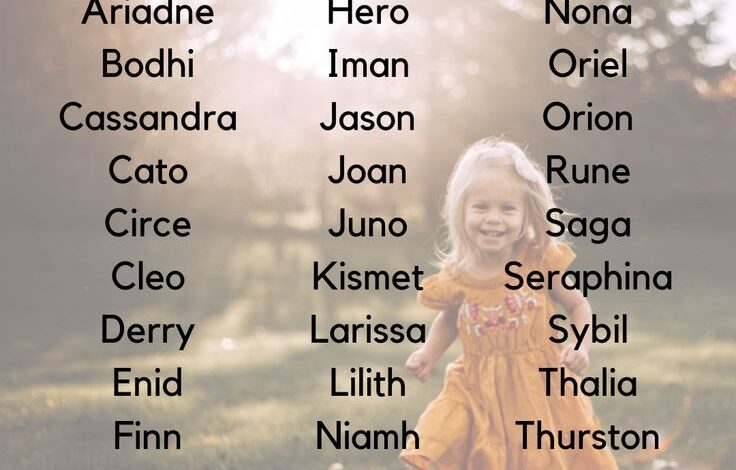Exploring Mystical Names: The Power and Meaning Behind Enigmatic Words

In various cultures and belief systems, names are not just identifiers; they carry deep meanings, Mystical names powers, and sometimes even magical properties. Among the most captivating of names are mystical names, which often evoke a sense of mystery, wonder, and sometimes fear. These names are more than just labels—they hold an aura of the unknown and are tied to ancient traditions, mythical creatures, and celestial beings.
In this article, we will dive into the fascinating world of mystical names, uncovering their origins, significance, and the powerful impact they have had in mythology, literature, and modern-day culture.
What Are Mystical Names?

A mystical names is typically a name that holds special spiritual, magical, or mythical significance. These names are often associated with entities, places, or ideas that transcend the ordinary world and venture into the realm of the unknown, supernatural, or otherworldly.
Key Features of Mystical Names:
- Symbolism: Many mystical names are chosen for their symbolic meaning, representing powerful forces, natural elements, or divine entities.
- Sound and Structure: The sound of a mystical name often carries a rhythmic or mystical quality, designed to invoke a sense of awe or mystery.
- Cultural Significance: These names often have deep roots in specific mythologies, religious texts, or ancient civilizations, making them valuable in understanding different cultures’ beliefs.
The Origins and History of Mystical Names
The history of mystical names can be traced back to ancient civilizations, where names were believed to have a direct connection to the soul or spirit. For instance, in Ancient Egypt, names were often linked to magical powers, and people believed that to know the true name of a god or spirit was to have control over it. Similarly, in Greek and Roman traditions, the gods and goddesses were often given names that signified their dominion over various aspects of life.
As time progressed, mystical names began to be used in literature, art, and religion, where they continued to carry an air of mystique. These names were often used to evoke certain emotions or to represent ideas that were beyond human understanding.
Types of Mystical Names
Mystical names can be grouped into several categories, each serving a distinct purpose in the context of their respective traditions.
- Divine or Godly Names
These names are often attributed to gods, goddesses, or higher spiritual beings. They represent divine power and are central to many religious and spiritual practices.
- Examples:
- Zeus (Greek god of thunder)
- Isis (Egyptian goddess of magic and motherhood)
- Shiva (Hindu god of destruction and transformation)
These names evoke power, authority, and the sacredness of the divine.
- Elemental or Nature Names
These mystical names are tied to the elements of nature, such as water, fire, earth, and air, and often carry symbolism related to these forces.
- Examples:
- Aether (Greek primordial god of the upper sky and light)
- Flint (a stone that symbolizes strength and fire)
- Maris (a name meaning sea or ocean)
Such names can represent balance, harmony, or the untamed power of nature.
- Mythical Creature Names
These names are linked to legendary creatures, often with magical abilities or significant cultural relevance. These names can invoke a sense of awe and wonder.
- Examples:
- Phoenix (a mythical bird that regenerates from its ashes)
- Merlin (a legendary wizard in Arthurian legend)
- Cerberus (three-headed dog guarding the underworld in Greek mythology)
These names often reflect themes of rebirth, magic, and mystery.
- Magical or Enchanted Names
These names are associated with spells, magic, or the supernatural. They are often used in stories and rituals that involve wizards, witches, or sorcerers.
- Examples:
- Alatar (one of the wizards in Tolkien’s Middle-earth)
- Selene (Greek goddess of the moon, often associated with magic and mystery)
- Lirael (a character in Garth Nix’s “Abhorsen” series with magical abilities)
These names are powerful, as they evoke an image of secret knowledge or mysterious forces.
The Meaning Behind Mystical Names
Understanding the meaning behind mystical names can provide insight into the values and beliefs of the cultures that created them. Often, the names are imbued with symbolic meaning that connects them to the natural world, divine forces, or mythological stories.
Symbolism and Power
The power of a name is often linked to its meaning. For example, the name Ariadne (from Greek mythology) means “most holy” or “pure,” which reflects her status as a priestess and daughter of a god. Names like these convey a sense of reverence, holiness, or purity.
In other cases, mystical names are associated with destruction or creation, reflecting the duality of life and the world. Kali, the Hindu goddess of destruction, represents the transformative power of destruction, which clears the way for new beginnings.
Protection and Rituals
Some mystical names are used as protective talismans or in rituals to invoke safety, blessings, or prosperity. For example, the name Salem has been historically associated with both peace and dark history, making it a complex and powerful name in mystical practices.
Similarly, names like Gawain from Arthurian legend, a knight known for his virtues and courage, reflect ideals of protection and valor.
Mystical Names in Modern Culture
While the tradition of mystical names originates from ancient mythologies and religious practices, their influence is still felt in modern culture, especially in fantasy literature, video games, and popular media.
In Literature and Film
Many authors and filmmakers use mystical names to add depth and intrigue to their stories. Famous characters like Gandalf from The Lord of the Rings or Dumbledore from Harry Potter are more than just fictional characters—they are representations of wisdom, power, and mystery. The names themselves hold deep symbolic significance, and they often reflect the character’s role in the story.
In Video Games and Fantasy Worlds
In the world of video games and role-playing games (RPGs), mystical names are often used to create an immersive experience for players. These names are designed to make the in-game world feel alive and full of magic. For example, characters in games like Skyrim or World of Warcraft are given mystical names that tie into the fantasy universe they inhabit, helping players connect with the characters and their journeys.
The Role of Mystical Names in Modern Spirituality
Many people today are still drawn to mystical names in the context of spirituality and personal growth. In New Age practices, mystical names are sometimes chosen for their symbolic power, as they are thought to connect individuals to higher realms or universal truths. These names may be used in rituals, meditation, or as part of a personal transformation journey.
Some people even adopt mystical names for their children, believing that the name can influence their child’s destiny. For example, Phoenix is a name that symbolizes rebirth and transformation, which some parents choose with the hope that their child will embody these qualities.
How to Choose a Mystical Name
If you are considering choosing a mystical name, whether for yourself, a character, or your child, it’s important to understand the significance of the name. Here are some tips for choosing a meaningful mystical name:
- Research the Meaning: Understand the cultural and historical significance of the name. Is it linked to a specific god, goddess, or mythological creature?
- Consider the Sound: Often, mystical names have a melodic or rhythmic quality. Does the name feel powerful or enchanting when spoken aloud?
- Personal Connection: Choose a name that resonates with your personal beliefs, experiences, or aspirations. The name should feel meaningful to you.
Conclusion: Embracing the Power of Mystical Names
In conclusion, mystical names hold a unique place in human culture, connecting us to ancient traditions, powerful deities, mythical creatures, and magical forces. They carry deep symbolism and have the power to inspire, protect, and transform. Whether you are exploring the mystical world for personal growth, creating a fictional character, or simply fascinated by the beauty of these names, they offer an endless source of wonder and meaning.
By understanding the origins, meanings, and cultural significance of mystical names, you can better appreciate the magic they hold and how they continue to influence our world today. So, whether you are looking for a name for a character in a story, a new identity, or simply an appreciation of mystical traditions, these names are timeless and continue to captivate us.





